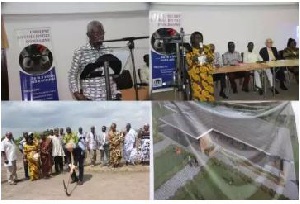 Nii Osah Mills, Minister of Lands and Natural Resources at a sod-cutting ceremony
Nii Osah Mills, Minister of Lands and Natural Resources at a sod-cutting ceremony
Nii Osah Mills, the Minister of Lands and Natural Resources, has called for strategies that would respond to youth crime, re-integration and after-care services to support the development of vulnerable children and the youth.
He said re-integration and after care services would address repetition, restore normal behaviour among juveniles and enhance reform.
Nii Osah Mills was speaking at a sod-cutting ceremony for the construction of a Re-integrated Juveniles Centre at Dodowa in the Greater Accra Region by the Child Research and Resource Centre (CRRECENT), a Non Governmental Organisation championing the re-integration of juveniles in Ghana.
He said the youth bulge was a common phenomenon in many developing countries including Ghana where social unrest of all kinds associated with children and young people could emerge.
“Ghana is going through a demographic transition where it is predicted that the population of adolescents and young adults in the country is expected to hit 5.3 million by the end of last year, 2015,” he said.
Nii Osah Mills said that could be gradually taking the country into the dreaded youth bulge phase.
He said government recently came up with a comprehensive work plan to compliment the National Youth Policy and stressed the need for public private partnership to take advantage of the work plan to address delinquency and juvenile crime in the country.
“It is our hope that civil society organisations, faith-based organisations, and corporate bodies among others will compliment government’s efforts to give hope to young people while securing the human resource of our dear country,” he said.
The Minister, therefore, commended the CRRECENT for directly intervening through its juvenile re-integration programme.
Ms Sussan Sabaa, the Executive Director of CRRECENT, said the centre had dedicated itself to the protection of young people over the past 10 years.
She said the dream to have the project started in 2003 when the Juvenile Justice Act came into being showed that there was a huge gap when young people left correctional centres and integrated into society.
Ms Sabaa said her organisation was commissioned in 2010 by Plan Ghana to do a baseline survey on the programme on Juvenile Justice in Ghana being supported by European Union.
“It was there that the dream got rekindled and became more urgent because the baseline brought out the challenges of young people who came out of incarceration to face in society. They are totally neglected, stigmatised and there is no structured programme to support them,” she said.
Ms Sabaa said the CRRECENT sought to give those young people what they needed to be effectively reintegrated into society.
She said they would move beyond reintegrating to providing the young people with shelter for their smooth transition into society.